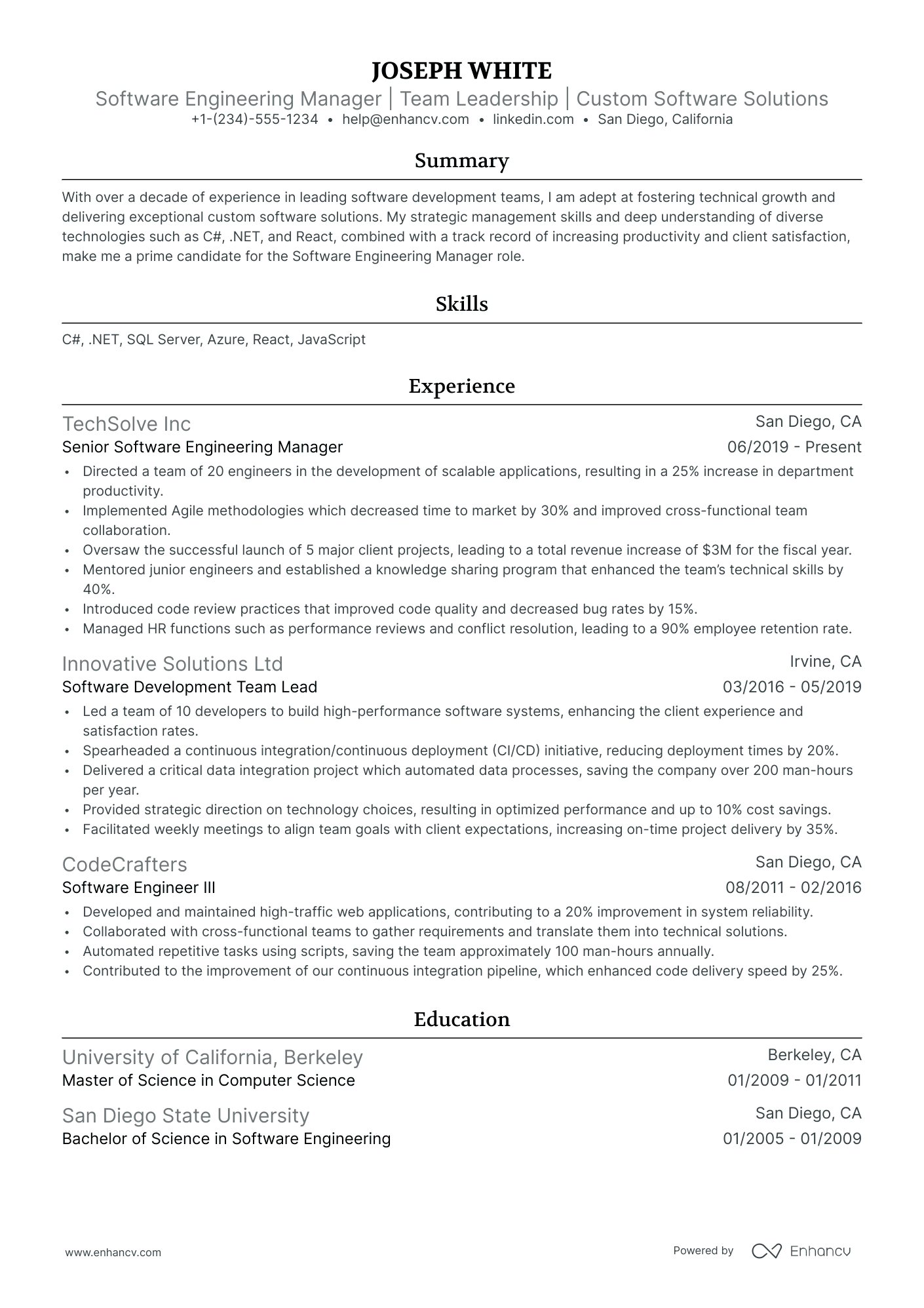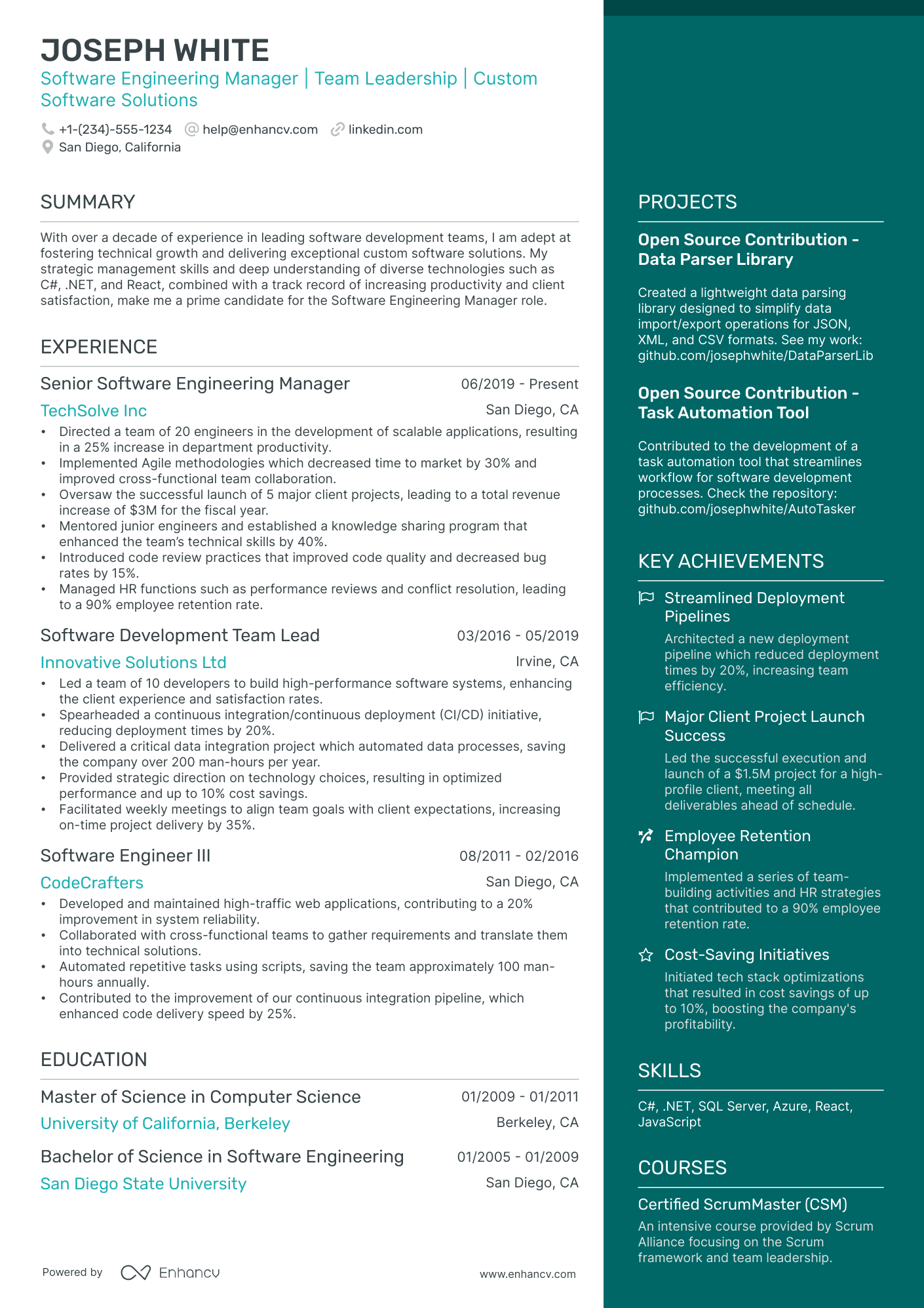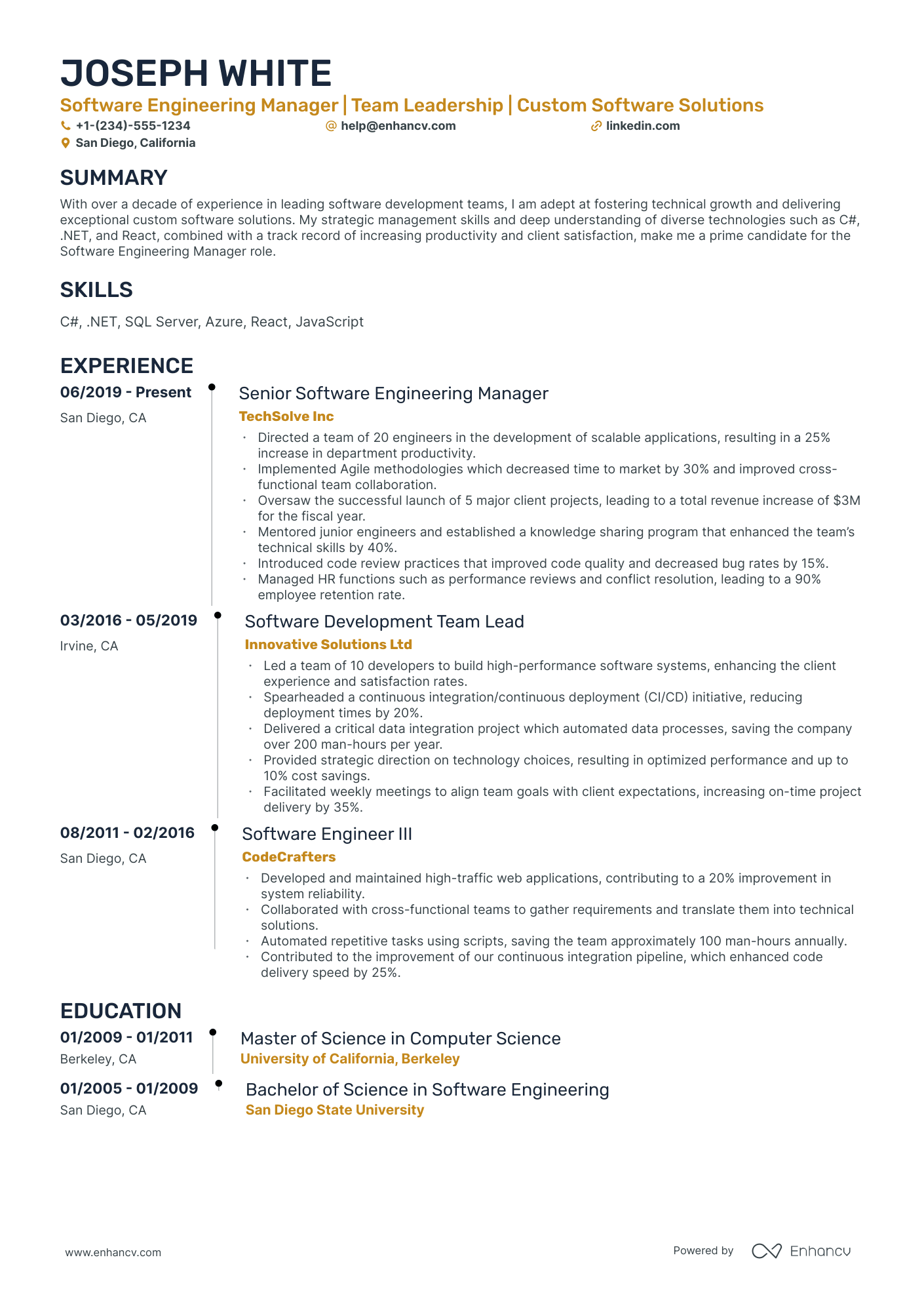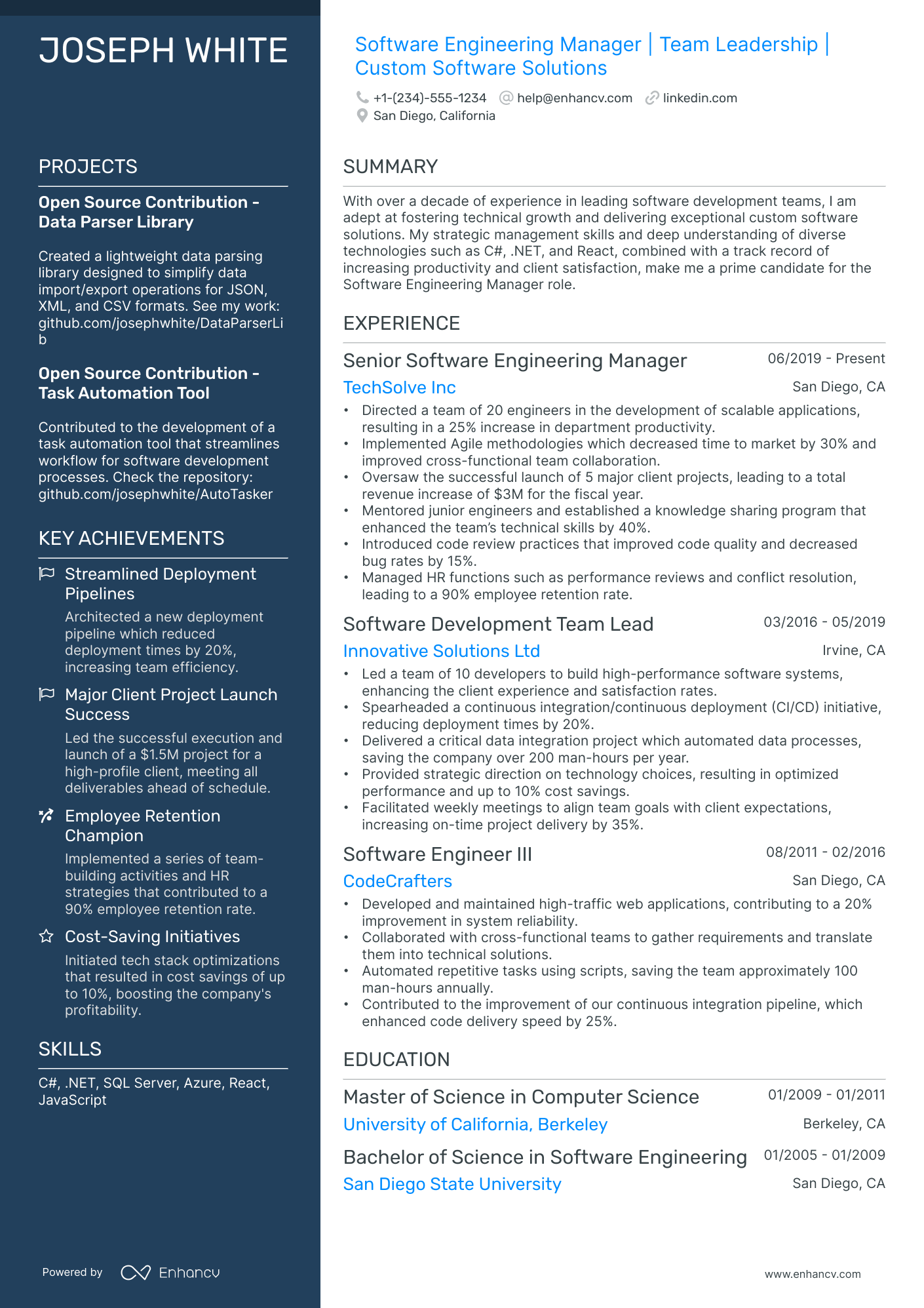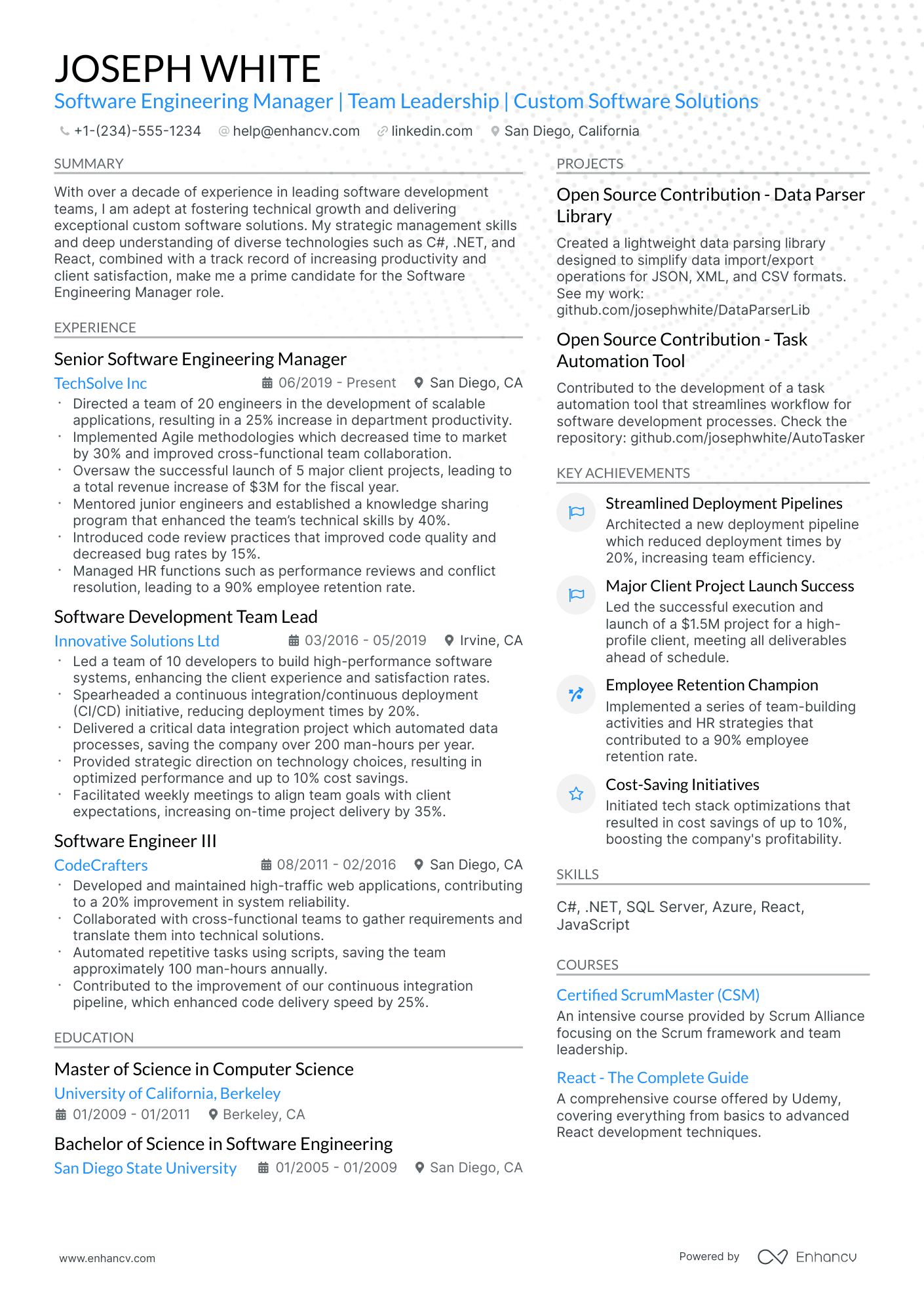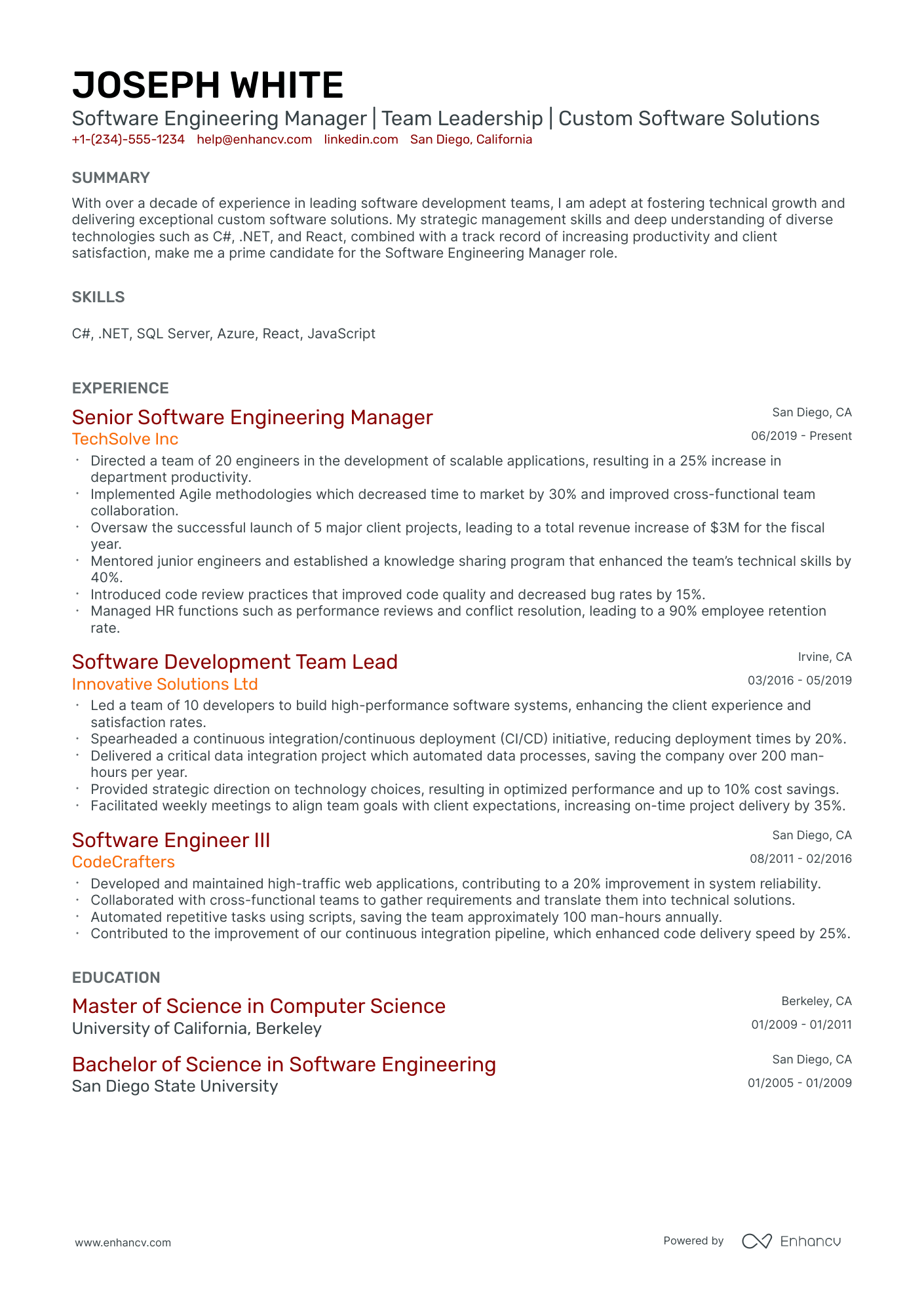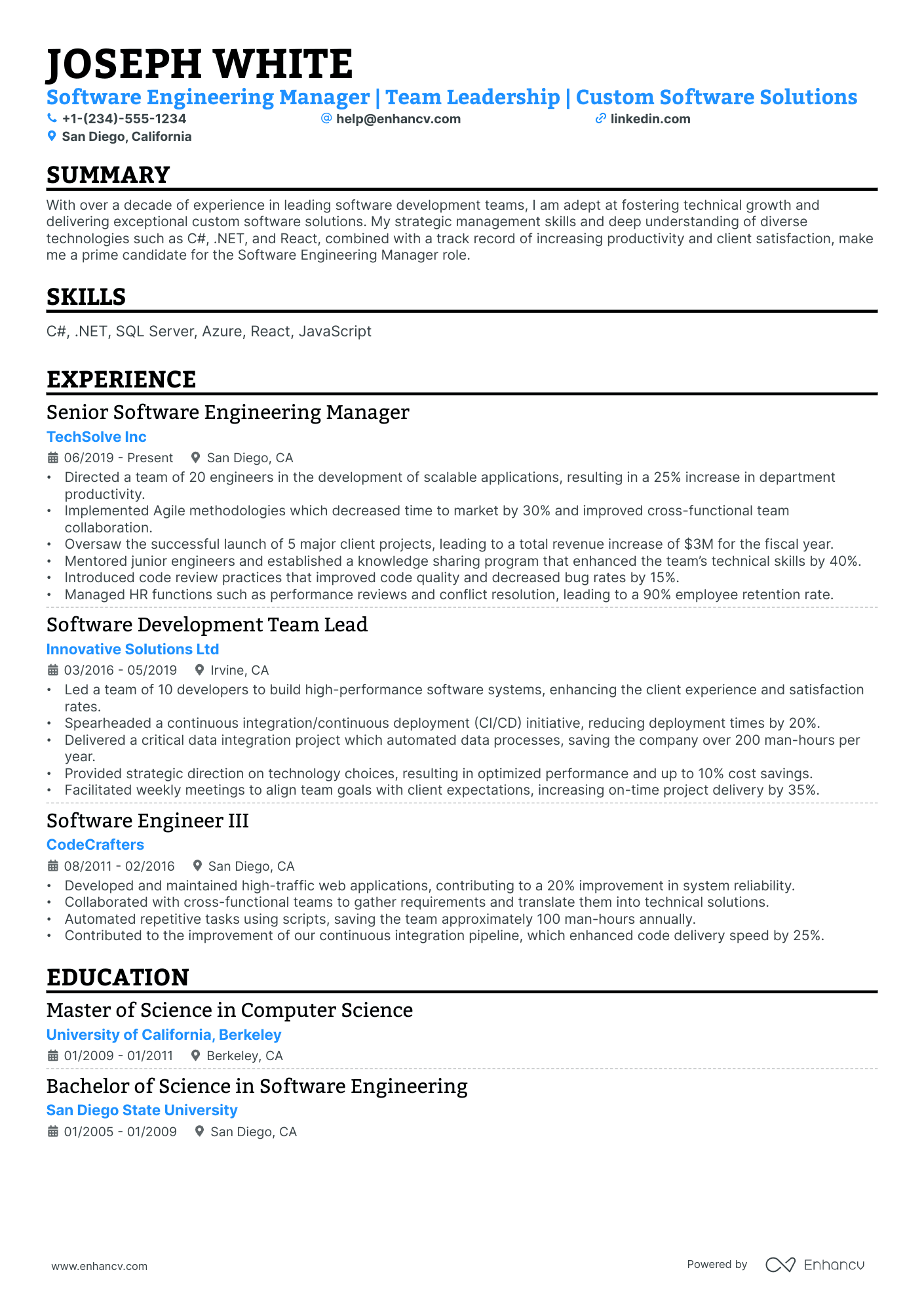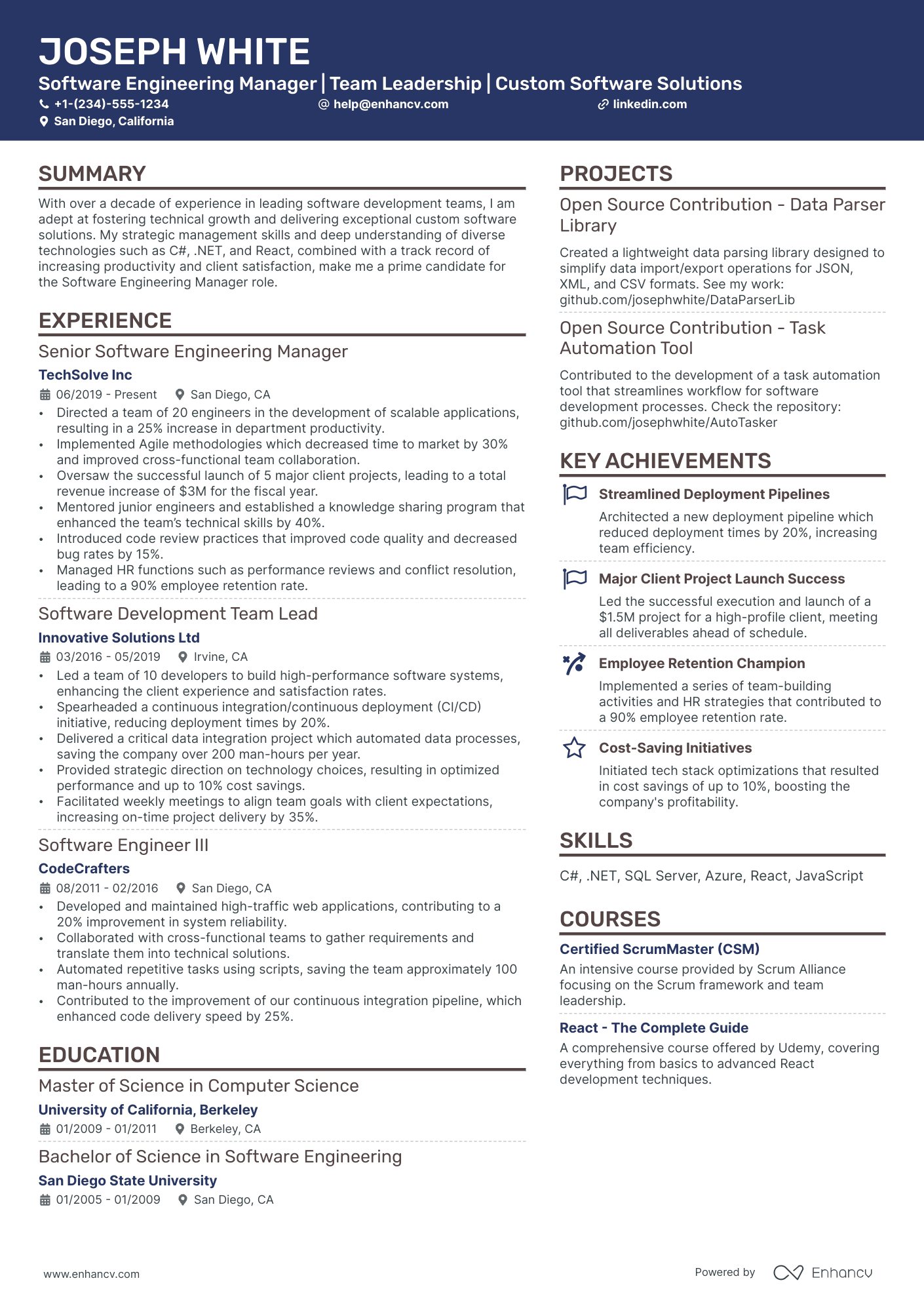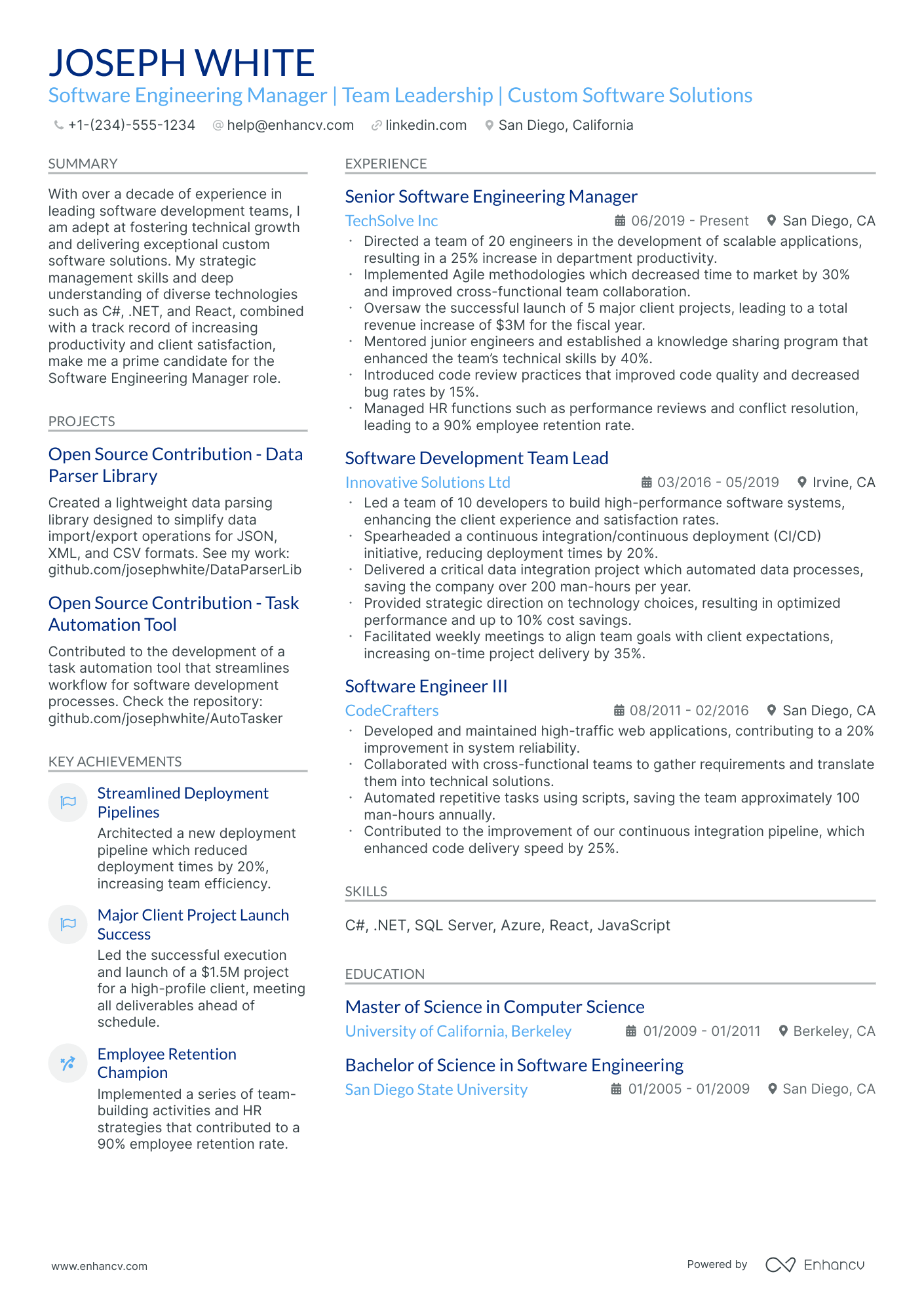One resume challenge you, as a software engineering manager, may encounter is effectively showcasing your technical leadership and project management skills without getting lost in technical jargon. Our guide offers strategies to strike the perfect balance, highlighting your expertise while maintaining clarity and impact to captivate hiring managers.
- Aligning the top one-third of your software engineering manager resume with the role you're applying for.
- Curating your specific software engineering manager experience to get the attention of recruiters.
- How to list your relevant education to impress hiring managers recruiting for the software engineering manager role.
Discover more software engineering manager professional examples to help you write a job-winning resume.
- Cognos Developer Resume Example
- Software Consultant Resume Example
- Software QA Manager Resume Example
- Software Development Engineer Resume Example
- Product Developer Resume Example
- Software Business Analyst Resume Example
- Software Project Manager Resume Example
- Software Development Manager Resume Example
- Integration Developer Resume Example
- Senior Oracle Developer Resume Example
Is there a correct way to format your software engineering manager resume?
This is a tricky question. While skimming over your resume, recruiters will be looking at your experience and the message your profile conveys. That's why your resume format needs to be clear and concise, serving to supplement and organize your experience. Professional best practices point that the best software engineering manager resumes:
- Follow the reverse chronological order, where the most recent experience items are presented first . This is to keep your expertise succinct and to show recruiters your career growth over the years;
- Have a clearly defined header that includes all relevant contact information and a portfolio or a LinkedIn link. In some countries, it is acceptable to include a professional photo , so that your application is more memorable;
- Feature the most important software engineering manager resume sections towards the top, e.g. summary, skills, and experience. That way, recruiters can immediately find information that is relevant to the role;
- Take up no more than two pages - and two pages are the exception for more experienced professionals. Keep your expertise to the point and use your software engineering manager resume real estate wisely .
- Selecting modern, yet simple fonts, e.g. Rubik, Lato, etc., would help your application stand out;
- Many candidates stick with the tried-and-tested Arial or Times New Roman, but you'd want your software engineering manager resume to be a bit more unique;
- The ATS can read all serif and sans-serif fonts, so you should avoid fancy, formal script (or cursive) fonts.
Upload & Check Your Resume
Drop your resume here or choose a file. PDF & DOCX only. Max 2MB file size.
PRO TIP
List all your relevant higher education degrees within your resume in reverse chronological order (starting with the latest). There are cases when your PhD in a particular field could help you stand apart from other candidates.
The key to your software engineering manager job-winning resume - present your expertise with these sections:
- A header to make your resume more scannable
- Snapshot of who you are as a professional with your resume soft skills, achievements, and summary or objective
- Job advert keywords in the skills section of your resume
- Resume experience quantifying your past job successes with metrics
- A relevant education, certification, and technical sills section to provide background to your technological/software capabilities
What recruiters want to see on your resume:
- Experience with leading software development teams and managing the full software development lifecycle (SDLC).
- Proficiency in multiple programming languages and technology stacks relevant to the company's projects.
- Demonstrated ability to deliver complex software projects on time and within budget.
- Strong leadership skills, including mentoring, coaching, and performance management of software engineering teams.
- Experience with agile methodologies, continuous integration, and continuous deployment processes.
Experts' advice on writing your software engineering manager resume experience
While the excitement and motivation for writing your software engineering manager resume was present in the first hour (or so), you now find yourself staring at the blank page.
The resume experience section is the one that allows you to make a memorable impression by matching job requirement with your past jobs and accomplishments.
To help you write this resume section, here are four mistakes you need to avoid:
- Listing every job you have had so far, including the irrelevant ones. Before that, consider each of your past roles based on relevancy to the role. It may be the case that the job you had 15 years ago may have taught you invaluable skills that are appropriate for the role;
- Including irrelevant work experience items. Those are past jobs that aren't linked with the role you're applying for (or so they seem). Consider how your past jobs will serve your professional presentation: will they be filling in a gap in your work history, or just taking up space?
- Focusing on responsibilities instead of accomplishments. Your software engineering manager resume shouldn't just be telling recruiters what you did in the past - as it's most often the case that candidates have had similar responsibilities. But, rather, the experience section should showcase the success you've attained in each past role, thanks to your unique skill set;
- Consider listing just your professional experience. Any role you've had in the past - e.g. volunteering, internships, etc. - can make it into your software engineering manager resume experience section. Make sure to include it alongside numbers and results.
Two more things you need to remember about your resume experience section.
The first are keywords. Or those specific job requirements that are crucial for the role . Ensure you've integrated them across your experience section to get sorted closer to the ideal candidate profile by the Applicant Tracker System (ATS).
The second are action verbs. Each of your experience bullets should start with a strong action verb, followed by your specific skill and your on the job achievements. Follow this formula to hint to recruiters what your unique value as a professional is.
Still with us? In the next section, we will show you how industry-leading professionals have avoided the four most common mistakes, while integrating keywords and action verbs in their experience section.
- Led a team of 15 software engineers to develop a scalable cloud-based analytics platform, improving data processing speed by 40%.
- Managed partnership integration with key stakeholders, contributing to a 20% increase in annual recurring revenue.
- Spearheaded the transition to a microservices architecture, significantly enhancing system reliability and deployment flexibility.
- Orchestrated the complete redevelopment of an e-commerce platform, increasing customer transactions by over 30%.
- Implemented Agile methodologies, reducing average product delivery time from 4 to 2 weeks.
- Collaborated with cross-functional teams to introduce AI-driven recommendation systems, boosting user engagement by 25%.
- Directed the development of a mobile application that led to a 50% increase in mobile revenue.
- Introduced Continuous Integration/Continuous Deployment (CI/CD) pipelines, cutting down release cycles by 35%.
- Pioneered the adoption of test-driven development practices, resulting in a 30% reduction in post-launch defects.
- Managed the migration of enterprise software systems to the cloud, leading to a 20% reduction in operating costs.
- Established a DevOps culture, improving the team's operational efficiencies and application availability.
- Negotiated with external software vendors to integrate cutting-edge technologies, enhancing system capabilities and user experience.
- Developed and implemented a comprehensive security protocol for software projects, reducing vulnerability incidents by 45%.
- Managed software release schedules across multiple teams, ensuring on-time delivery for 95% of projects.
- Coordinated with the sales and marketing departments to align product features with market needs, driving a 15% increase in market share.
- Drove the technical vision and architectural decisions for a suite of payment processing products, processing over $1 billion annually.
- Developed a talent growth strategy that resulted in a 40% increase in team productivity over a 2-year period.
- Liaised with key clients to understand their unique requirements, tailoring products that led to a 20% uptick in customer satisfaction.
- Led the development of an enterprise-grade CRM system, improving sales efficiency by 25%.
- Championed a company-wide initiative for code quality, leading to a 40% reduction in critical bugs.
- Contributed expert-level knowledge to the company's patent portfolio, filing 5 patents in the field of predictive analytics.
- Oversaw the successful launch of a real-time analytics tool, resulting in a 35% increase in decision-making efficiency for clients.
- Cultivated a high-performance team culture, achieving a 90% retention rate over three years.
- Implemented a robust code review process, markedly enhancing code quality and reducing downtime by 22%.
- Instrumental in building a cross-platform application framework, which reduced development costs by 30% while increasing outreach to new platforms.
- Launched a mentorship program to upskill junior engineers, greatly improving team competency and project delivery success.
- Negotiated key technical partnerships that expanded the company's service offerings and technological capabilities.
- Revolutionized the company's cloud infrastructure strategy, enhancing system scalability and disaster recovery protocols.
- Managed software engineering teams globally, fostering collaboration across time zones and increasing team efficiency by 20%.
- Championed a user-centric product design approach, which improved end-user satisfaction ratings by 30%.
Quantifying impact on your resume
- Include the number of development projects you've successfully managed and completed, demonstrating your direct impact on product delivery.
- State the budgets you've managed, highlighting your financial acumen and ability to control costs effectively.
- Specify the size of engineering teams you've led, showcasing your leadership and team-management skills.
- Mention the percentage increase in team productivity or project output under your management to show your efficient operational capabilities.
- Quantify the improvement in software quality or reduction in bug rates to illustrate your focus on excellence and product integrity.
- Document any reductions in time-to-market for the products you've overseen to underscore your ability to accelerate development cycles.
- Detail the revenue growth or market share expansion that resulted from your projects to link your work directly to business outcomes.
- Cite any industry awards or recognitions that your teams or projects received, providing a quantifiable reputation boost.
Action verbs for your software engineering manager resume
What to do if you don't have any experience
It's quite often that candidates without relevant work experience apply for a more entry-level role - and they end up getting hired.
Candidate resumes without experience have these four elements in common:
- Instead of listing their experience in reverse-chronological format (starting with the latest), they've selected a functional-skill-based format. In that way, software engineering manager resumes become more focused on strengths and skills
- Transferrable skills - or ones obtained thanks to work and life experience - have become the core of the resume
- Within the objective, you'd find career achievements, the reason behind the application, and the unique value the candidate brings about to the specific role
- Candidate skills are selected to cover basic requirements, but also show any niche expertise.
Recommended reads:
PRO TIP
Showcase any ongoing or recent educational efforts to stay updated in your field.
Popular software engineering manager hard skills and soft skills for your resume
Apart from assessing your professional expertise, recruiters are on the lookout for whether your skills align with the job.
Your profile would thus be assessed in regard to your:
- Hard or technical skills - your ability to perform on the job using particular technologies or software
- Soft skills - how you adapt, communicate, and thrive in different environments.
Both types of skills - hard and soft skills - are important for your resume, so make sure to create a dedicated skills section that:
- Lists up to five or six skills that align with the job advert.
- Integrates vital keywords for the industry, but also reflects on your personal strengths.
- Builds up further your skills with an achievements section within which you explain what you've achieved thanks to using the particular skill.
- Aims to always quantify in some way how you've used the skill, as it's not enough to just list it.
What are the most sought out hard and soft skills for software engineering manager roles?
Check out the industry's top choices with our two dedicated lists below:
Top skills for your software engineering manager resume:
Java
Python
JavaScript
Docker
Kubernetes
AWS
Git
SQL
Microservices
Agile methodologies
Leadership
Communication
Problem-solving
Time management
Team collaboration
Conflict resolution
Adaptability
Strategic thinking
Mentoring
Decision making
PRO TIP
If you happen to have some basic certificates, don't invest too much of your software engineering manager resume real estate in them. Instead, list them within the skills section or as part of your relevant experience. This way you'd ensure you meet all job requirements while dedicating your certificates to only the most in-demand certification across the industry.
Discover the perfect certification and education to list on your software engineering manager resume
Value the insights your resume education section offers. It can shed light on various proficiencies and experiences tailored for the job.
- Add only college or university degrees, stating the institution and duration.
- If you're nearing the end of your degree, note your graduation date.
- Weigh the pros and cons of including unrelated degrees - it might not be your best choice with so little space on your resume.
- Talk about your educational achievements if they amplify your relevant experience.
There are so many certificates you can list on your resume.
Just which ones should make the cut?
- List your prominent higher education degree in a separate box, alongside the name of the institute you've obtained it from and your graduation dates
- Curate only relevant certificates that support your expertise, hard skills, and soft skills
- Certificates that are more niche (and rare) within the industry could be listed closer to the top. Also, this space could be dedicated to more recent certifications you've attained
- Add a description to your certificates or education, only if you deem this could further enhance your chances of showcasing your unique skill set
When listing your certificates, remember that it isn't a case of "the more, the merrier", but rather "the more applicable they are to the industry, the better".
Recruiters have hinted that these are some of the most in-demand certificates for software engineering manager roles across the industry:
The top 5 certifications for your software engineering manager resume:
- Project Management Professional (PMP) - Project Management Institute (PMI)
- Certified ScrumMaster (CSM) - Scrum Alliance
- Certified Information Systems Security Professional (CISSP) - (ISC)²
- Professional Engineering (PE) - National Society of Professional Engineers (NSPE)
- SAFe 4 Program Consultant (SPC) - Scaled Agile, Inc.
PRO TIP
The more trusted the organization you've attained your certificate (or degree) from, the more credible your skill set would be.
Recommended reads:
Deciding between a resume summary or objective for your software engineering manager role
Understanding the distinction between a resume summary and an objective is crucial for your software engineering manager resume.
A resume summary, typically three to five sentences long, offers a concise overview of your career. This is the place to showcase your most pertinent experience, key accomplishments, and skills. It's particularly well-suited for those with professional experience relevant to the job requirements.
In contrast, a resume objective focuses on how you can add value to potential employers. It addresses why they should hire you and outlines your career expectations and learning goals. Therefore, it's ideal for candidates with less experience.
In the following section of our guide, explore how resume summaries and objectives differ through some exemplary industry-specific examples.
Resume summaries for a software engineering manager job
- Seasoned software engineering manager with over 12 years of experience leading cross-functional teams in developing scalable and robust systems for fintech industries. Demonstrated ability to optimize software delivery processes, resulting in a 40% increase in deployment efficiency. Expert in Agile methodologies and cloud computing, with a track record of successful product launches.
- Experienced professional pivoting to Software Engineering Management after 10 years in project management for healthcare IT. Possesses strong command of Python and Java, with proven success in leading technology projects that enhanced patient data security and care delivery. Acknowledged for implementing strategic initiatives that increased operational efficiency by 30%.
- As a former aerospace engineer with over 8 years of experience, I bring a unique perspective to software engineering management, coupled with advanced skills in C++ and system architecture design. Successfully directed the creation of simulation software that reduced testing costs by $2 million annually. Eager to apply robust problem-solving skills to tech industry challenges.
- Dedicated and driven with a solid foundation in computer science garnered from a top-tier university, eager to apply theoretical knowledge and fresh perspectives as an entry-level software engineering manager. Passionate about crafting innovative software solutions that leverage the latest technologies to drive business growth and customer satisfaction.
- Beginning a career in software engineering management, I am eager to bring my recent master’s degree in software engineering and internship experience, where I contributed to the development of a mobile application that saw a user increase of 150% within three months. Committed to fostering a collaborative team environment that encourages innovation and continuous learning.
- Adept in managing high-performing software development teams, bringing 15 years of industry experience with substantial contributions to open-source initiatives. Renowned for leading the design of an award-winning software suite that improved data analytics processes for e-commerce platforms. Focused on leveraging extensive technical expertise in Ruby on Rails and JavaScript to spearhead challenging projects.
More sections to ensure your software engineering manager resume stands out
If you're looking for additional ways to ensure your software engineering manager application gets noticed, then invest in supplementing your resume with extra sections, like:
These supplementary resume sections show your technical aptitude (with particular technologies and software) and your people skills (gained even outside of work).
Key takeaways
- Your resume layout plays an important role in presenting your key information in a systematic, strategic manner;
- Use all key resume sections (summary or objective; experience; skills; education and certification) to ensure you’ve shown to recruiters just how your expertise aligns with the role and why you're the best candidate;
- Be specific about listing a particular skill or responsibility you've had by detailing how this has helped the role or organization grow;
- Your personality should shine through your resume via the interests or hobbies, and strengths or accomplishments skills sections;
- Certifications go to provide further accreditation to your technical capabilities, so make sure you've included them within your resume.
